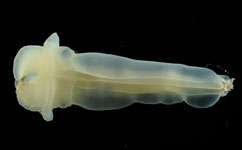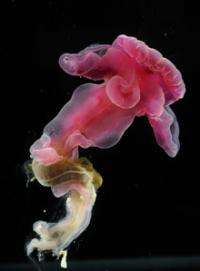New species of 'spiral poo worms' found in the Atlantic

They could be mistaken for exotic blooms, but the colorful creatures captured in the depths of the Atlantic Ocean actually belong to a family of recently discovered acorn worms.
The worms were collected last year by scientists using a remotely-operated vehicle aboard the RRS James Cook, during a research expedition to the Mid Atlantic Ridge. DNA tests identified them as a new species of worm related to the Torquaratoridae family.
The worms have gone undetected until now because the primitive deep-sea grabs and dredges used in earlier years would have destroyed their fragile bodies. Their shallow-water relatives, which have acorn-shaped heads, are rarely seen as they burrow into the sea bed.
"Acorn worms are a real curiosity; for hundreds of years we have seen spiral poo trails in fossils but no-one knew what they were from," says Professor Monty Priede, director of Aberdeen University's Oceanlab and leader of the expedition. "There were no "footprints" between the spirals so it was a mystery as to what type of animal had made them, until just a few years ago when researchers discovered a spiral poo worm in the Pacific Ocean."

The delicate creatures have no eyes or tail, but manage to crawl around the muddy ocean floor in a spiral pattern, hoovering up food and expelling waste as they move along.
"The worms have a dorsal nerve and a primitive spinal cord so can give us an insight into what the early ancestors of fish and other back-boned animals would have been like," says Priede.
"The key thing that's missing is the tail so, rather than swimming as it feeds, the worm moves more like a snow plough, shovelling nutritious sediment into its open mouth. It drags its gut along, leaving the characteristic spiral in its wake."
Although unable to swim, the worms can lift themselves off the sea floor to drift on currents between patches of suitable feeding ground.
Priede thinks that this could be the start of an 'evolutionary explosion' of these animals, with 15 new species discovered so far and more likely to be found in the coming years.
"I thought all the great discoveries had been made in the 1800s at the time of Charles Darwin," he says. "Finds like this demonstrate that the age of discovery is far from over."
Provided by PlanetEarth Online
This story is republished courtesy of Planet Earth online, a free, companion website to the award-winning magazine Planet Earth published and funded by the Natural Environment Research Council (NERC).




















